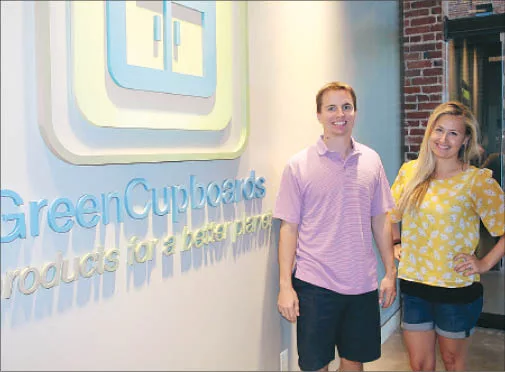Green retailer GreenCupboards says sales are on rise
GreenCupboards moves into new location with room for further growth

GreenCupboards Inc., the Spokane-based eco-friendly online retailer, recently moved to the McKinstry Innovation Center of Spokane, a transition that comes on the heels of a steady increase in sales and employment since the startup's founding.
Located at 850 E Spokane Falls Blvd., GreenCupboards markets about 15,000 products from more than 600 suppliers.
"Really, anything you'd find in a household, we try to find eco-friendly alternatives," CEO Josh Neblett says.
Neblett co-founded the company in 2008 with Sarah Wollnick, who now serves as vice president of supplier relations, when they were undergraduate students at Gonzaga University. Tom Simpson, originally Neblett's adjunct professor his senior year, is also a co-founder. He provided the company with office space and was the initial investor in the startup. Simpson is still an active participant in the company and continues to have a hand in major decisions.
"It was more or less supposed to be a glorified science project," Neblett says of the startup. Now, four years later, GreenCupboards touts itself as the leading online retailer for eco-friendly products.
For 2008, GreenCupboards posted $5,000 in revenue. Tove Tupper, the company's director of communications, says the company expects to bring in more than $15 million in revenue this year, more than double its $7.2 million in sales in 2011.
Neblett says he expects revenue growth in 2013 to be similar to this year.
The increase in the company's revenue has led to employment growth.
Neblett says the company currently has 55 employees, with an average age of 26 among the workforce. He anticipates hiring five more people by the end of the year. At the end of 2011, he says, GreenCupboards employed 42 people, up from 14 people the prior year.
Tupper says the company became profitable in 2011 and has remained profitable since then.
The company operates by purchasing about 70 percent of the products at wholesale and selling at retail price. Tupper says the remaining 30 percent of the products are drop ship, meaning the manufacturer ships the product directly to the customer rather than going through GreenCupboards.
Over the next year, Neblett says, he hopes to continue to build on GreenCupboards' environmentally focused culture and to continue to automate its online processes, positioning it for further growth.
Tupper is part of a six-person group known as the green compliance team that meets once a week to evaluate products on the company's website. She says the team is in charge of making sure products it carries aren't engaging in a tactic known as green washing, meaning deceptively marketing products as eco-friendly.
She says earlier this year the team identified 24 traits of what they believe make a product on the site green. Items on the website are labeled with a series of eco-traits, such as fair trade, kosher, and carbon neutral, to help customers identify easily why certain products are sold through GreenCupboards.
Tupper says those eco-traits act as a search and shopping tool for online visitors just as much as it is an evaluative tool for the green compliance team.
"We just don't put something up on the website because the supplier says it's green," Tupper says.
When the company was first starting out, Tupper says it was relatively easy to decide what was going on the site. As it grew, the green compliance team was created to make sure it could still maintain control of the product quality through product research.
Neblett says he looked for a new space for GreenCupboards for about two months before choosing the McKinstry location. He says there were several locations downtown, but none of them seemed right.
"You should walk in the space and say, 'Wow, this is GreenCupboards,'" he says.
GreenCupboards originally operated out of a space located above the Olive Garden restaurant in the Old City Hall building, at 221 N. Wall in downtown Spokane. Neblett says the space, which was located in the Northwest Venture Associates office, another one of Simpson's businesses, amounted to a hallway desk.
The company later moved to 114 W. Pacific before its most recent move to the McKinstry building.
"It was a great location, but at the end of the day, we were bursting at the seams," Neblett says.
The company moved into its current 9,000-square-foot McKinstry space in August. Tupper says it currently occupies about half of that space and will use the other half to accommodate future growth.
"This new building and space allows us to be more open and transparent between the different departments," Tupper says. "Josh isn't about titles and hierarchy; we're all a team and I think the office space promotes that."
Along with housing GreenCupboards, the McKinstry building is the new home of an innovation center, geared toward providing a place for startups to gain a foothold. Neblett describes the center as a place GreenCupboards would have utilized four years ago.
In early August, GreenCupboards attempted to break the world record for the largest piece of recycled paper. Tupper says it contracted an independent surveyor to measure the attempt, which she says clocked in at 1,338 square feet.
The world record currently is held by a city in Japan, whose attempt measured 1,037 square feet. Tupper says it takes between six and eight weeks to hear back from the Guinness World Record office in London. She says different community groups and Earth Works Recycling came out to help GreenCupboards break the record.
Related Articles

_c.webp?t=1763626051)

_web.webp?t=1764835652)
